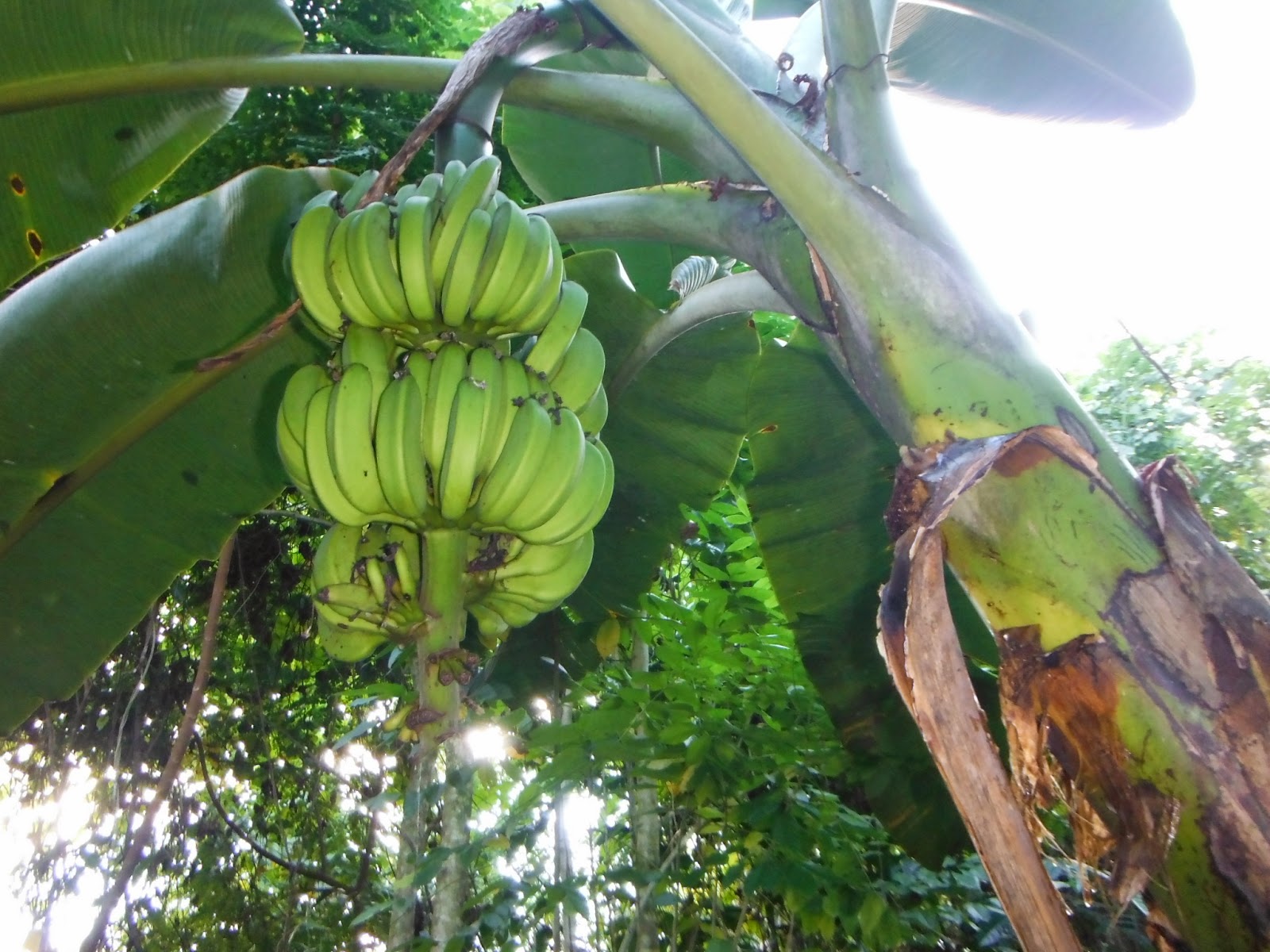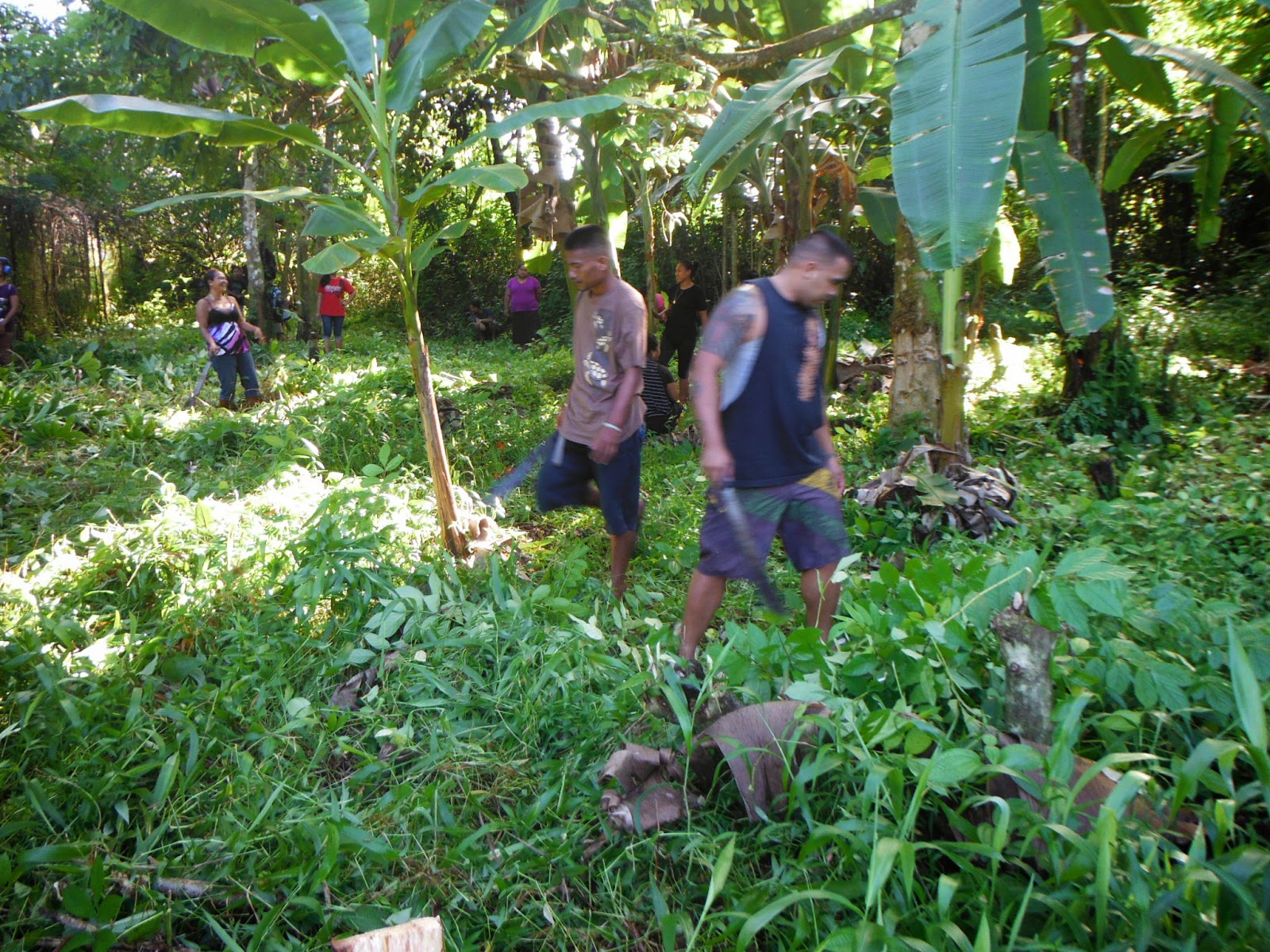Banana patch cleaning and some tentative banana identifications
On the 18th of November the SC/SS Ethnobotany class cleaned up the banana patch, which continues to be overrun by Clidemia hirta, and I worked with the students on identifying those with fruit or flowers.
This banana at N 6° 54.663' and E 158° 9.329' provoked the most discussion. The location best matches a rhizome planted by Roxann Moya and thought by her to be karat. Clearly this is not karat. The initial determination was kerenis, although another thought it might be uhten wai, which would be a AAA Cavendish. A third student thought it was simply a young uhten ruhk. Utin kerenis, which may be a reference to Kapinga, is an AA; Pisang Raja banana by my sources. Utin Ruhk is an ABB Saba banana.
The same banana at N 6° 54.663' and E 158° 9.329'.
Another view of the banana at N 6° 54.663' and E 158° 9.329'.
The above banana at N 6° 54.670' and E 158° 9.328'well matches the location of an uhten rais planted by Karmi Soar at N 6° 54.670' and E 158° 9.330' . The student concurred in the uhten rais apellation.
Uhten rais at N 6° 54.670' and E 158° 9.328'
Uhten rais at N 6° 54.670' and E 158° 9.328'
Uhten rais at N 6° 54.670' and E 158° 9.328'
Although not fruiting, the banana at N 6° 54.671' and E 158° 9.330' appears to roughly match the location of an uhten menihle planted by Joey Seiola. Some students said this was an uhten kuam which they claim is the same as an uhten menihle. My sources say both are AAB; Silk but finger is longer in utin kuam (source spelling), menihle has a smaller finger. That kind of distinction could come down to soil differences.
Jake Manuel and Dwayne Hadley cleaned up around the Daiwang banana planted at at N 6° 54.673' and E 158° 9.332'. Rockyner Hadley claimed to haveplanted a Daiwang at that same location in the corner, coordinates then of N 6° 54.674' and E 158° 9.333' Dwayne identified the bananas as Daiwang before knowing that Rockyner had planted a claimed-to-be Daiwang, so that seems to be confirmatory for me.
This banana at N 6° 54.663' and E 158° 9.329' provoked the most discussion. The location best matches a rhizome planted by Roxann Moya and thought by her to be karat. Clearly this is not karat. The initial determination was kerenis, although another thought it might be uhten wai, which would be a AAA Cavendish. A third student thought it was simply a young uhten ruhk. Utin kerenis, which may be a reference to Kapinga, is an AA; Pisang Raja banana by my sources. Utin Ruhk is an ABB Saba banana.
The same banana at N 6° 54.663' and E 158° 9.329'.
Another view of the banana at N 6° 54.663' and E 158° 9.329'.
The above banana at N 6° 54.670' and E 158° 9.328'well matches the location of an uhten rais planted by Karmi Soar at N 6° 54.670' and E 158° 9.330' . The student concurred in the uhten rais apellation.
Uhten rais at N 6° 54.670' and E 158° 9.328'
Uhten rais at N 6° 54.670' and E 158° 9.328'
Uhten rais at N 6° 54.670' and E 158° 9.328'
Although not fruiting, the banana at N 6° 54.671' and E 158° 9.330' appears to roughly match the location of an uhten menihle planted by Joey Seiola. Some students said this was an uhten kuam which they claim is the same as an uhten menihle. My sources say both are AAB; Silk but finger is longer in utin kuam (source spelling), menihle has a smaller finger. That kind of distinction could come down to soil differences.
Virginia Sartilug.
Judy Ligohr
Judy Andon, Shirley-ann Rudolph
Katielyne Nianugmwar
Rockson Salihk, Katielyne
Melody Tulenkun
Jake Manuel
Melody
Dwayne Hadley
Gary Totong
Virginia
Joemar Wasan, Dwayne
Judy Ligohr
Judy
Marvin Louis
Joemar
Shirley-ann
Jennnifer Panuelo with a knife, Kanio idle in the background
Arnold Panuelo, observer only
Katielyne and Andrea Ewarmai
Judy Ligohr, left, and Judy Andon, still working when most were now resting including Maylani on the left in the background. Dwayne, Marvin, and Joemar were also still at work.
Dwayne still working
Judy Andon also still working
Jake cleaning up around a Daiwang in the background, Ronda up front.
Fence damage.
Daiwang, AAB; Pisang kelat bananas
Daiwang.
There are more to be identified, but without fruit this is difficult. The Clidemia hirta may be allelopathic and slowing the growth of some bananas.








































Comments
Post a Comment